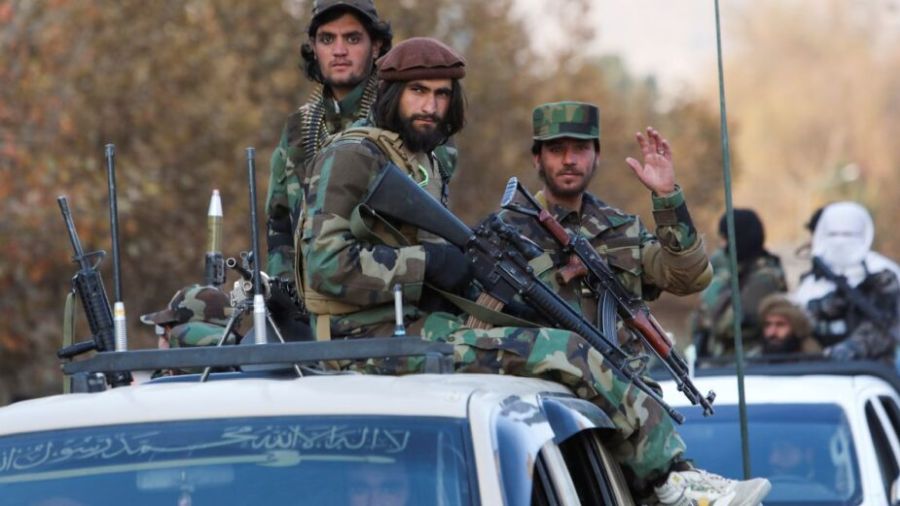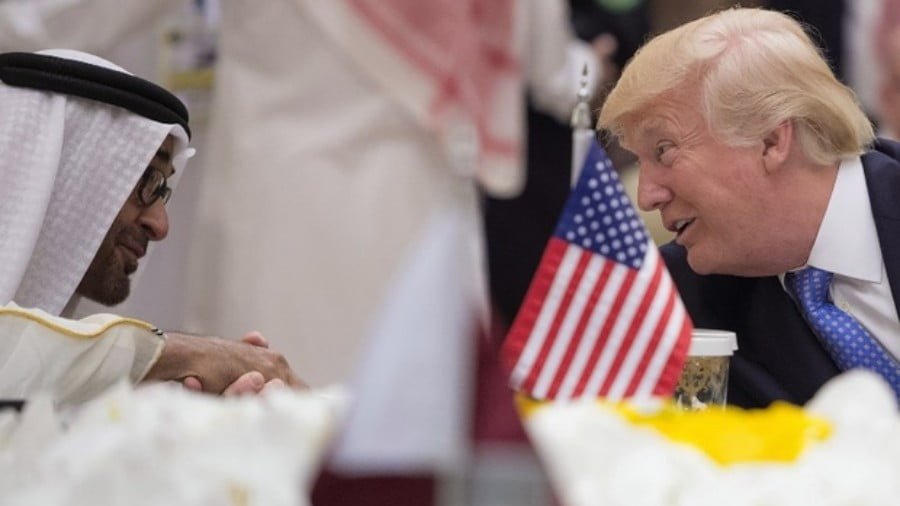Afghanistan One Year On. The West Didn’t ‘Lose’ the War, Actually
The real reason why America went there was actually a pipe dream which had nothing to do with fighting the Taliban, Martin Jay writes.
Western media pundits scramble to arrange the clichés about how the West lost a military defeat in the graveyard of empires. The real reason though why America went there in the first place was actually a pipe dream which had nothing to do with fighting the Taliban.
One year after the Taliban took control of Afghanistan after the West exited the country in such a craven way, girls are banned from attending high school, many women can’t work, and over 90 percent of households don’t have enough to eat. In the last couple of weeks though, western media focused on America’s latest gripe about the country: whether U.S. arms, planes, tanks and vehicles left there would end up on the battlefield used against Ukrainian soldiers and western mercenaries.
On this anniversary of the western world’s greatest failure and surely the last nail in the coffin of its perceived hegemony, western journalists grasp their laptops and pound out the unedifying clichés about the state of the country, while families of the victims tell Joe Biden it is morally repugnant for him to keep the money – 7 billion dollars held in New York banks – which is the property of the government of Afghanistan.
Ever get the feeling that the real story of Afghanistan is something you will have to wait a couple of decades for at least, for key people to die and for documents to be released to show what the West’s real objectives there were – and why it left in the way and at the time, that it did?
For the real truth to emerge, which few western hacks even know and even fewer want to write about, we have to go back to the start of the story, which is not in 2001 when the twin towers came crashing down from what we are told is due to aviation fuel of two jets melting steel girders of the structure. We have to go back to 1989 when George Bush senior took office, a Texas oil man, and was lobbied by a Californian oil company called Unocal which had big plans of building a huge gas pipeline stretching from Turkmenistan, through Afghanistan onto finally Pakistan. Bush and his cronies like Cheney saw the possibility of tapping into 6 trillion dollars of natural gas with this project, which could work in tandem with a second colossal American project in the region which also crossed Afghanistan and stretched from India to the Mediterranean coast. Both grand projects would compliment one another and quite apart from breaking America’s dependency on Middle Eastern oil and gas, would also no doubt make those who pulled off such a deal very rich indeed. The second project was the blueprint of none other than Enron whose corrupt relationship with the Bush family is a legend.
But dirty relations with dirty players – and their dirty money – is the core of the story.
For all of Bush senior’s term in office, he failed to sign off the deal with the one group in Afghanistan he needed both for security of the pipeline and for the one region of the country (Kandahar in the south of Afghanistan) where some believed it could draw huge quantities of gas and oil: the Taliban.
No U.S. president thinks he will only stay in office one term. Bush senior failed to take the deal forward as negotiations with this group – which controlled much of the country even before they came to power officially – and so it was left to Clinton to do his best. In 1997, Clinton who had been courting the Taliban government after Kabul fell in 96, invited a Taliban delegation, draped in traditional garb, to visit Texas and finally the White House itself. In fact, the Taliban came twice in the same year on shopping sprees and visits to zoos.
The bombing of U.S. embassies in Kenya and Tanzania in 1998 provided a brief respite to America’s attempt to cosy up to the Taliban, egged on by the Saudis who were quick to point out that it would be useful in the region to have cordial relations with such an anti-Iran regime.
And so Clinton finally kept on pushing for the deal despite the fact that Al Qaeda was being hosted by the Taliban. In fact, some even believe that bin Laden was also a key target of the lobbying. Given what we now know about Clinton, is it possible that the Bush clan had something on him, involving Epstein?
Still the deal could not be agreed, until even when the Taliban were in office in August 2001 when the G. W. Bush administration was negotiating with them, right up until 9/11. In fact, as recently as July 2001, Christina Rocca, the U.S. Assistant Secretary of State for South Asia, met Taliban officials in Islamabad and announced $43 million in food and shelter aid, bringing to $124 million the U.S. had given to the so-called pariah state which was apparently linked to U.S. embassy bombings.
Conspiracy theorists assert that the Twin Towers attack was brought about by Mossad which wanted the West to be more sympathetic towards striking hardcore Islamic groups in the Middle East. If George W. Bush were aware of such a plot, surely, he and Cheney would then use it as a pretext to get into Iraq and Afghanistan to pursue their lust for free oil and gas?
There is even evidence of the Americans working with Bin Laden until that point which merely backs up the assertion that 9/11 was an inside job.
Within days, George W. Bush, whose election expenses were underwritten by the CEO of Enron to the tune of 600,000 USD, announced an invasion. And U.S. troops lost no time in building a base, curiously, in the location of the country where the oil and gas pipelines would have to pass through, possibly kicking up a stir: Kandahar.
The problem for the Americans was that they didn’t want to build infrastructure in Afghanistan which is what the Taliban asked for; nor did they want the pipeline to give gas to local people within the country. The 100 million dollars a year the Taliban had asked for, simply for the pipeline to function, was probably doable – but which couldn’t be from U.S. taxpayers coffers. But they knew there would be trouble with the pipeline in Kandahar.
The Twin Towers attack must have had Unocal directors opening champagne. Surely this was the moment George W. was waiting for to appease the American people’s lust for revenge and to get into Afghanistan, while ousting the Taliban all at the same time.
The first deal, involving Unocal – which had a number of impressive partners, including the Saudis – could go ahead. All what was required after the Taliban government fell was to secure the perimeter of the entire region with military hardware and soldiers to protect the investment. Before 9/11, both Bush presidents were considering paying the Taliban millions to protect their interest. Now, George W. was laughing all the way to the bank as he would get the oil and gas moved across the region and not cough up a dime for the security – which would be paid by the U.S. taxpayer as American soldiers would lose their lives in this mass graveyard for two decades fighting for a Bush family megadeal.
Yet within days of Americans taking power in Afghanistan, Bush junior made an appointment which should have raised eyebrows among American journalists.
He appointed a former aide to the American oil company Unocal, Afghan-born Zalmay Khalilzad, as special envoy to Afghanistan which tells you all you need to know about why America went into Afghanistan in the first place.
The nomination was announced December 31, nine days after the U.S.-backed interim government of Hamid Karzai took office in Kabul and showed clearly what the priorities were: economic and financial interests now rich for picking once the U.S. military intervention in Central Asia took root.
As an advisor for Unocal, Khalilzad drew up a risk analysis of a proposed gas pipeline from Turkmenistan across Afghanistan and Pakistan to the Indian Ocean. This was the same Khalilzad who set up the talks between the oil company and Taliban officials in 1997, after a 1995 agreement to build the pipeline across western Afghanistan fell through.
But did the Americans at some point believe that the south of Afghanistan itself might be a good place for oil and gas exploration?
Perhaps part of the long-term strategy in Afghanistan was to overpower it and build a wall around Kandahar province so as to extract its resources – a goal which inevitably was never achieved, given that the Taliban also knew the value of the region and what the Americans were up to. This is really the main reason the Americans stayed so long as they believed wrongly, that when a tipping point could be reached the energy deal could begin. Part of that murky deal involved bribing and paying off a lot of people – or at the very least allowing powerful figures to continue their extraction of opium from the country to fill their own pockets. The goal was always cheap, if not free, oil.
The apex of this big idea – and the same one in Iraq – was reached sometime around 2010 under Obama who had given up any ideas of securing a yet-to-be-built pipeline and began to reduce the numbers of troops in both Iraq and Afghanistan, knowing full well that the U.S. was not achieving anything other than build the grassroots support up of the Taliban.
It’s the same objective in Iraq and even in Iran where Americans dream one day of reaping oil and gas profits as Britain and America did in the old days leading up to the revolution which began in 1979. Those who prove to be difficult and resist America’s endeavours for free oil – Libya, Iran and Syria for example – are immediately stigmatised as rogue states. Naturally.
The few articles which mark the anniversary of the West pulling out of Afghanistan only serve to offer the gullible public a smokescreen, with the incongruous references to “defeat” militarily and picking over the bones of where and when it all went wrong. But in reality, this is false. The “defeat” was not actually militarily but more ideological and commercial. The country for the best part of twenty years was used to contain dirty money used to pay terrorists in Syria and other places and the new regime was clearly not going to allow this business to continue. It is also inconceivable that the billions made from heroin exports were not possible without the assistance of the DEA and CIA in what are called ‘controlled drug shipments’, another neat way of western countries paying terrorist organisations, criminal gangs or fascist dictatorships for helping Uncle Sam. For the elite in Afghanistan who need to get hundreds of millions of dollars out on a regular basis, they would need a little help from their American friends.
Indeed, the abrupt exit of Ashraf Ghani, the president carrying hundreds of millions of dollars in suitcases aboard a helicopter, was an indicator that the money laundering halted abruptly once the Taliban looked set to enter the capital. Not so much the ‘art of the deal’ but more ‘the end of the deal’. All bets off.
Corruption between the industrial military complex and a succession of American presidents – and their cabals – of course also ended on the same day, which, in my view, explains why Ukraine became the new location for dirty money, made through arms sales. The real Afghanistan story can actually be found in Ukraine as the similarities are striking. Dirty money, illicit arms sales and the byproduct money laundering. In Afghanistan, the Americans lost almost 300 million dollars a day, largely spent on military equipment. If you ask those in the cabal of Cheney and Bush junior whether the West “lost” Afghanistan, they would be hard pressed to agree with this analogy as all good things must come to an end. Afghanistan was in many ways a poignant milestone where it became clearer that America had transferred its political gravitas from a morality base to one of greed and graft on the battlefields of Kandahar where over 2.000 U.S. soldiers were slain like lambs while many people in the Bush circle got very, very rich indeed.







